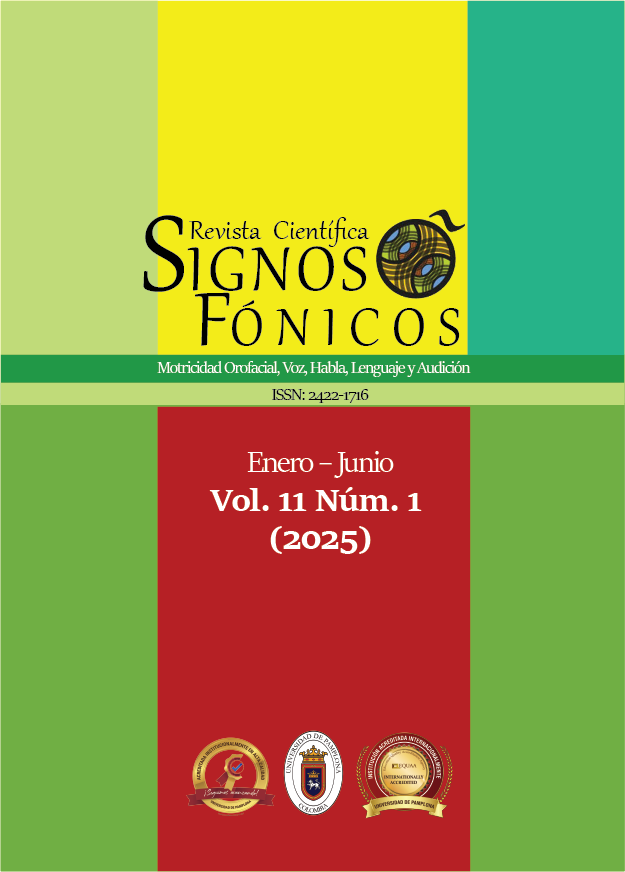Use of ICT in the development of phonological awareness in a student with mild intellectual disabilities
DOI:
https://doi.org/10.24054/fqznzw30Keywords:
Phonological Awareness, Intellectual Disability, Information and Communication Technologies (ICT)Abstract
Phonological awareness is part of a set of linguistic and cognitive skills that serve as predictors of reading acquisition. Typically developing children acquire this skill approximately between the ages of 4 and 8. There is evidence indicating a lag in the performance of phonological awareness tasks in children diagnosed with intellectual disability. In recent years, the use of Information and Communication Technologies (ICT) has extended beyond recreational purposes to include therapeutic applications. This study aims to integrate new therapeutic methodologies to enhance the development of phonological awareness in a child with mild intellectual disability. The implementation of the ICT-based activity “task X from program X” proved effective in improving phonological awareness performance.
Downloads
References
Arancibia B. Bizama M. y Sáez K. Aplicación de un programa de estimulación de la conciencia fonológica en preescolares de nivel transición 2 y alumnos de primer año básico pertenecientes a escuelas vulnerables de la Provincia de Concepción, Chile. Revista Signos. 2012;45(80):236-256. http://dx.doi.org/10.4067/S0718-09342012000300001
American Psychiatric Association. Manual diagnóstico y estadístico de los trastornos mentales DSM-5. 5ª edición. Editorial médica Panamericana: 2014.
Domínguez A. Diseño de videojuego como terapia de juego para niños con Asperger. Scielo. 2021;98(1): 129-140. https://dx.doi.org/10.18682/cdc.vi98.3976
Drigas A, Petrova A. ICTs in Speech and Language Therapy. 2014;4(1):49-54. http://dx.doi.org/10.3991/ijep.v4i1.3280
Fälth L, Selenius H, Nilsson S, Svensson I. Reading acquisition among students in Grades 1–3 with intellectual disabilities in Sweden. Dyslexia an International Journal of Research and Practice. 2024;30(3):1-12. https://doi.org/10.1002/dys.1781
Gómez L. Duarte A. Merchán V. Aguirre D. y Pineda A. Conciencia fonológica y comportamiento verbal en niños con dificultades de aprendizaje. Scielo. 2007;6(3):571-580. Disponible en: http://www.scielo.org.co/scielo.php?script=sci_arttext&pid=S1657-92672007000300009
Gutiérrez R. De Vicente-Yagüe M. y Alarcón R. Desarrollo de la conciencia fonológica en el inicio del proceso de aprendizaje de la lectura. Revista Signos. 2020;53(104):664-681. http://dx.doi.org/10.4067/S0718-09342020000300664
Hernández R, Fernández C, Baptista P. Metodología de la investigación. 6ª edición. Mc Graw Hill; 2014.
Herrera A, Leal-Kaymalyz C. Percepción de fonoaudiólogos sobre nuevas tecnologías de la información y comunicación. Revista Areté. 2024;24(1):45-54. https://doi.org/10.33881/1657-2513.art.24105
Márquez J. y Osa P. Evaluación de la conciencia fonológica en el inicio lector. Anuario de Psicología. 2003;34(3):357-370. Disponible en: https://revistes.ub.edu/index.php/Anuario-psicologia/article/view/8737
Ministerio de Educación. Programa de Integración Escolar, Ley de Inclusión 20.845. Manuel de apoyo a la inclusión escolar en el marco de la reforma educacional.
Paul R, Norbury C, Gosse C. Language Disorders from Infancy through Adolescence. 5ª edición. Elsevier; 2018.
Pérez M. y González M. Desarrollo del conocimiento fonológico, experiencia lectora y dificultad de la tarea. Revista de Logopedia, Foniatría y Audiología. 2004;24(1):2-15. https://doi.org/10.1016/S0214-4603(04)75770-8
Saeedi S, Bouraghi H, Seifpanahi M, Ghazisaeedi M. Application of Digital Games for Speech Therapy in Children: A Systematic Review of Features and Challenges. Journal of Healthcare Emngineering. 2022; 1-20. https://doi.org/10.1155/2022/4814945
Santos J, Sanz L. DSM-5: Novedades y criterios diagnósticos. Cede: 2013.
Sermier R. De Chambrier A. Martinet C. Moser U. y Bayer N. Exploring Phonological Awareness Skills in Children With Intellectual Disability. AJIDD. 2017;122(6):476-491. https://doi.org/10.1352/1944-7558-122.6.476
Sermier R, De Chambrier A. The role of phonological awareness and letter-sound knowledge in the reading development of children with intellectual disabilities. Research in Developmental Disabilities. 2015;41(1):1-12. https://doi.org/10.1016/j.ridd.2015.04.001
Soltani A, Roslan S. Contributions of phonological awareness, phonological short-term memory, and rapid automated naming, toward decoding ability in students with mild intellectual disability. Research In Developmental Disabilitie. 2013;34(3):1090-1099. https://doi.org/10.1016/j.ridd.2012.12.005
Varela V, De Barbieri Z, Beltrán J, Godoy C, Guerra A, Sánchez M. Prueba de Evaluación de Conciencia Fonológica (PECFO). Ediciones UC; 2015.
Van Tilborg A. Segers E. Van Balkom H. y Verhoeven L. Predictors of early literacy skills in children with intellectual disabilities: A clinical perspective. Research in Developmental Disabilities. 2014;35(7):1674-1685. https://doi.org/10.1016/j.ridd.2014.03.025
Valle-Zevallos M, Mendez-Vergaray J, Flores E. La conciencia fonológica y su relación con la lectura: Revisión sistemática. Horizontes, revista de Investigación ciencias de la educación. 2024;8(33):1004-1021. https://doi.org/10.33996/revistahorizontes.v8i33.779
Downloads
Published
Issue
Section
License
Copyright (c) 2025 Vargas-villegas D, Eugenia-Boyé M, Vásquez Fernández P. Uso de tics en el desarrollo de la conciencia fonológica en un estudiante con discapacidad intelectual. Revista Científica Signos fónicos; 2025; 11 (1): 52-58

This work is licensed under a Creative Commons Attribution-NonCommercial-NoDerivatives 4.0 International License.











